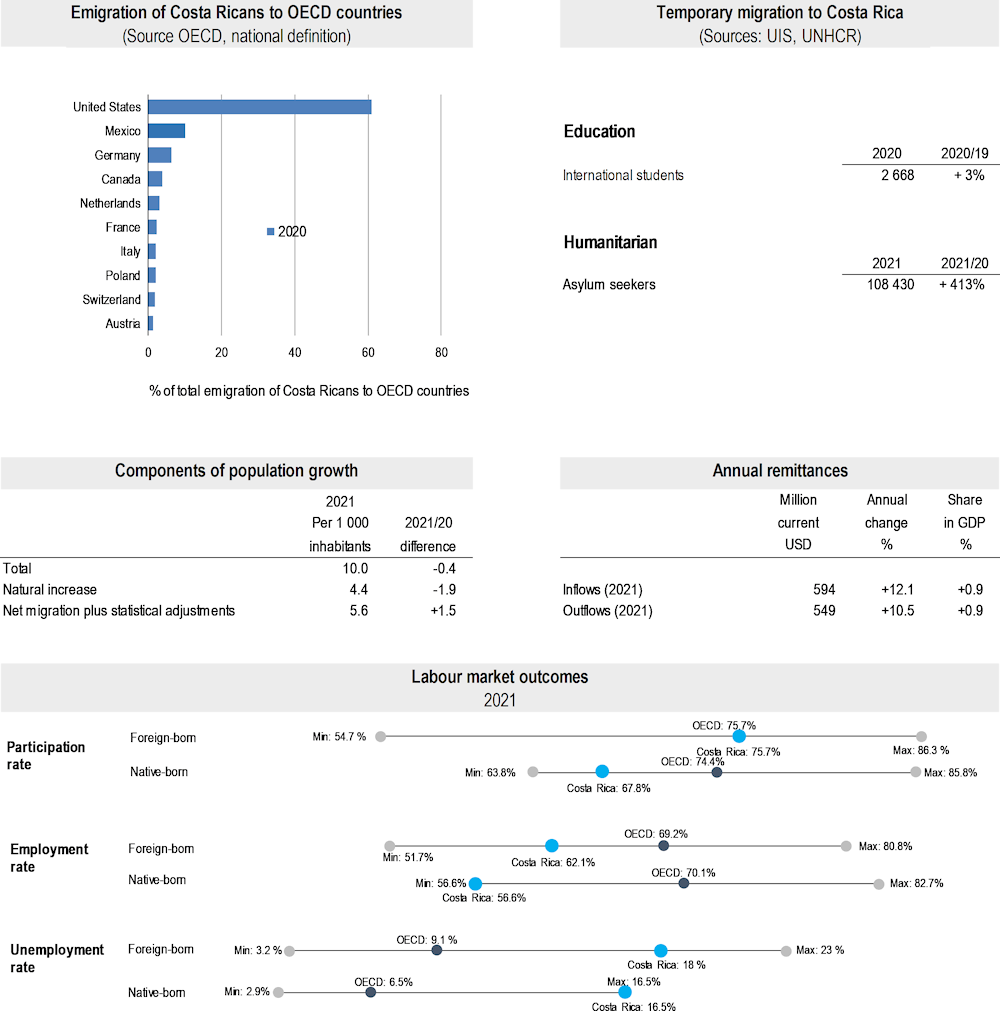In 2021, the number of first asylum applicants increased by 413%, to reach around 108 000. The majority of applicants came from Nicaragua (102 000), Venezuela (3 000), Haiti (900). The largest increase since 2020 concerned nationals of Nicaragua (92 500).
Migration policy in Costa Rica is largely shaped by efforts to regulate immigration from its Central American neighbours and from Venezuela. In 2021, the Costa Rican Government implemented a new protection mechanism for irregular migrants. The measure aims to provide temporary protection to Venezuelan, Nicaraguan or Cuban nationals who entered the country between January 2010 and March 2020 and whose asylum applications have been rejected.
Specific measures are in place for people from neighbouring countries near border areas. In January 2021, the Government of Costa Rica enacted a decree to allow indigenous Nicaraguan and Panamanian nationals living in bordering areas with Costa Rica to work on specific activities. They are authorised by the General Directorate to enter and leave the national territory on a daily basis.
In August 2021, the Costa Rican Government implemented a one‑year working visa aimed at foreign nationals working remotely and extendable for an additional year under specific requirements. Under this “digital nomad” scheme, foreign nationals will be able to obtain a one‑year remote work permit that is extendable for an additional year if they meet certain salary, health insurance and other requirements. Workers under this scheme are exempt from local income taxes.
In November 2020, the Costa Rican and Nicaraguan Governments signed a binational agreement to regulate the temporary hiring of Nicaraguan workers in Costa Rica for the harvesting season 2020‑21. The agreement was implemented to offset labour shortages in the agricultural sector during the pandemic. In 2020‑21, around 6 700 seasonal migrant workers benefited from this measure. The bilateral agreement was extended in September 2021 for an additional seven months to cover the 2021‑22 harvesting season.
In July 2021, the Costa Rican Government adopted a new law that lowers investment requirements for obtaining temporary residence, encouraging the attraction of investors, pensioners and retirees. Among other measures, the law reduces the minimum investment amount to obtain temporary residence under the investor category from USD 200 000 to USD 150 000.
In the context of COVID‑19, Costa Rica decided to prolong all permits that expired after 1 October 2021 until 30 September 2022.
On the integration side, the Ministry of Public Education and the General Directorate enacted a co‑ordination protocol in January 2021, to regularise migrant children in the public education system. The protocol aims to decrease the dropout rates of migrant minors by providing better access to scholarships and degrees. Successful applicants will receive a legal status under the category of students.
In February 2021, the Costa Rican Government and UNHCR established a new agreement to provide medical coverage to refugees and asylum seekers in Costa Rica, starting in early 2021. The agreement expanded the previous medical insurance already implemented in 2020.
On 23 May 2022, the Government of the Republic published a decree which provides foreigners a special category for the migratory regularisation in order to work temporarily in the agricultural sector, averaging 18 000 permits annually.
Further information: https://www.migracion.go.cr

